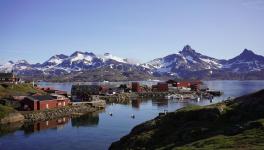In the High Noon of the Liberal View of Nature

Representational Image. Image Courtesy: Pexels
Though far from being religious I have to admit, and eighty years of muddling along on rough roads has convinced me, that most religions teach an indispensable truth: the need for restraint and moderation. Any passion or ideology followed without some degree of moderation leads to destruction.
This appears to be true of many of the ultra-right regimes in power in different countries in the world today. Whether it is Trump or Bolsonaro or leaders nearer home, that end is fore-ordained. All are driven by a passion or limitless ambition to accumulate wealth for a privileged elite and exploit nature and expand power without restraint. Technology is the magic wand to deliver all these, no matter at what cost. They believe in it as if possessed. But in the process common people endure extreme privation and suffering and perish like flies during a conflagration.
The draft Environmental Impact Assessment on the anvil today is a case in point. The curbs on private enterprise in its rapacious exploitation of nature had been put in place after prolonged reluctance and procrastination by governments when at last it had become clear that any further delay would upset the natural cycle of absorption of loss and restoration irreversibly. Scientists have openly wondered if the moment had indeed passed. To seek to roll back these half-hearted measures at this moment is an assured way to ruin.
From what has appeared in the public domain it is clear that taking unfair advantage of the Covid-19 pandemic, and the consequent constraints on public life in the attempt to control it, the government is hell-bent on lifting all crucial impediments that had been put on exploitation of nature out of concern for human survival and well-being. So in spite of their extravagant religious ceremonies and spiritual trumpeting such leaders rather recall the fate of demons of our ancient lore.
Popular ideas confound the environment and the encompassing surroundings which animals and human beings quarry at will. A faint consciousness has dawned that this exploitation is exhausting them and things have to stop at this point of no return. This in turn has given rise to calls for a full stop and total withdrawal, and an end to contemporary civilisation. Such ideas have made popular certain so-called saints who live in opulence and counsel everyone else to practice ascetic self-denial.
I think it was in 1970 that I purchased from the local Communist bookstall a slim paperback published by Nauka Publishing House, Moscow. The Soviet author Vladimir Vernadsky put across in The Biosphere a fascinating thesis in lucid language. He wrote that the earth was not so oxygen-rich billions of years ago as it is today or was until recently. In fact, it was surrounded by a thick blanket of carbon dioxide. And it was ancient life-forms that breathed carbon dioxide and exhaled oxygen so that gradually advanced animal species became possible. I read about it but found nobody interested, not even Communist friends. I forgot about it for thirty years until sustaining the environment had become a major concern of the world.
During my adolescence too I had been thrilled no end by Jules Verne’s famous novel, A Journey to the Centre of the Earth, with background rich in colourful accounts of marine life. The wonder was deepened by Rachel Carson’s fascinating The Sea Around Us, 1951, available then as a Pelican paperback for Rs.2 or 3, and a vague sense of reverence filled my mind. But there were few people I found who were interested in protecting nature with the knowledge of science. In fact, pollution and mutilation of nature were regarded as the price of progress for a pretty long time. Even in the Soviet Union the largest fresh-water body in the world, lake Baikal, became a victim of heedless development.
The lesson Vernadsky taught is that both life and its environment are not separate but closely interlocked spheres, with each incessantly interacting with the other in a chain of mutual dependence. The idea that human beings can uninterruptedly consume and use up natural resources with impunity is a fatal fallacy. We are in fact destroying the natural conditions that enable us to live. Technology maniacs believe it will still be possible to artificially go on producing necessary amounts of oxygen even if all natural resources dry up, but that will be possible and affordable for only a fraction of people and besides it will destroy the web of life.
Hence the need for general circumspection and planning, not for continued domination but for what is now called sustainable relationship. That does not necessarily mean a complete hands-off approach, but a sensible and responsible use of natural resources based on our knowledge. The folly is to think that we can go battering around and find technological fixes for every problem that comes along. A warning comes from the fact that even space is as fast getting filled up with debris as we are moving ahead with space exploration, rather like a region polluted and driven to barrenness by rapacious mining.
The second vital point to emerge from the churning on environmental issues is that the lives and livelihoods of vast masses of labouring people, small farmers, fishermen, forest people and all those not yet sucked into the whirlpool of modern industrial production are critically dependent on the natural environment, which is being eroded by corporate recklessness.
The first alarm bell in India was sounded by the Bhopal gas tragedy of 1984, which exposed the horrors of extensive poisoning of atmosphere by chemical industry running amok. Rajiv Gandhi, who was suspected of having colluded in letting the culprit escape, made amends by introducing the first and fairly comprehensive bill on environment in the country, the Environment Protection Act of 1986. It was subsequently enlarged and enriched by other steps like formation of the National Green Tribunal and the environment policy of 2006 in the light of accumulating knowledge. These were all progressive initiatives, though frequently subverted by the government in devious collusion with profit-greedy businessmen and industrialists. At odds against the latter there has grown up a dedicated lobby of environmentalist NGOs whose detailed exposure of wrong-doings by corporates paradoxically does not seem to have much public impact, owing perhaps to the filtering by the metropolitan media which appear to be more enamoured of technological marvels.
Segmentation and compartmentalisation of various social interests have also favoured splintering of political decisions that ultimately helps corporates to get away with their worst outrages. In Western countries the Green lobby is quite powerful and at times it weighs in on significant political decisions on use of natural resources, but in India they still remain marginal. Political parties of different hues too somehow seem reluctant to face the question squarely.
***
At this juncture while headlines are monopolised by scary news about Covid-19 and glimpses of hope on the horizon, the government has been busy dismantling the entire structure of protective and preventive laws and regulations, perhaps with a view to undoing what its bugbear, “the Nehru-Gandhi dynasty” is presumed to have built over seven decades.
The very policy on environment is sought to be redrawn in a way favourable to polluting industries and enterprises that are impatient with all environmental restraints and most lethal to common people. It is notorious that years ago the building of the Sardar Sarovar Dam had submerged flourishing fertile land and numerous villages had been re-settled on stony, barren land by way of compensation. That was at the dawn of globalisation and liberalisation.
We are now about to see the destructive power of this high noon of the “liberal” view of nature. The new draft policy on the drawing board is aimed at “regularising” the most irregular interventions in the environment by powerful tycoons and corporates so far, and preventing all such future violations on grounds of national security or some vague national interest.
The Baghjan calamity in Assam has taken place because oil and its private associates have been quietly violating environmental laws and regulations for fifteen years with the connivance of top officials in government. In a region rich in biodiversity broadly called Dehing Patkai zone, many other such projects are already going in full swing. It is now proposed in the draft policy that post facto approval of such blatant violations of norms will be granted with imposition of a fine, which will be calculated by pliant officials in proportion to the damage done.
In fact the new policy embodied in an act is designed to provide a legal cover to such violations in areas such as “modernisation or irrigation projects, all building constructions and area development projects, expansion and widening of national highways, all projects covering national defence and security”, by relaxing vital Environmental Impact Assessment rules. It proposes to exempt most building construction projects of built-up areas up to 1,50,000 sq meters without citing any rational justification.
Industries have been categorised into groups requiring various degrees of scrutiny and it is a scandal, as pointed out by environmentalists, that highly-polluting industries such as cement and chemical fertilisers have been placed in category “B”, requiring minimal scrutiny.
There cannot be any conceivable justification for such relaxations except meeting the insatiable appetite for profit of corporates. For while these might contribute to the GDP they will impoverish the lives of the people.
We in Assam are at the receiving end of such “progress” at loggerheads with public interest. The sweeping four-lane highway that ensures fast transport is now festooned with toll gates that raise the cost of transport. Built at a height to escape floods it leaves many formerly thriving villages in a limbo. The high dams that are coming up are like a sword hanging over our heads. Rampant tree-felling and deforestation for such projects interfere with the natural inflow and outflow of excess water during rains and have added to the fury of floods. So our teeth are set on edge by promises of more “vikas”.
Previous environmental laws left room for some public scrutiny and action in regard to projects that might cause grave public harm, though they were often short-circuited by official deviance or negligence. Now the weight of opinion of the affected communities or the public is to be drastically scaled down. And in the case of projects involving “national defence and security” the public will be denied any information whatsoever. As if that excuse is justified to annul all considerations of public good. And who knows what kind of projects will be propped up as serving “national security”, like the celebrated “money bills” during the first round of the NDA government?
A group of more than 60 former bureaucrats who had held offices at the highest levels of responsibility has appealed to the Prime Minister to call a halt to such environmental outrages and to initiate a “more people and habitat friendly policy”. They plead that the government does not own national resources but it only holds them in trust on behalf of people “whose commons these are”. But it is usually a tendency of governments in our country that they think just the opposite, misusing the doctrine of eminent domain in the most blatant manner. It is also an unpalatable fact that even Opposition parties are lukewarm about it. Now that the cost of environmental degradation stares everyone in the face (except perhaps maniacal demagogues like Trump), there ought to be a nationwide resistance against this revision of environmental policy.
The author is a socio-political commentator and cultural critic. The views are personal.
Get the latest reports & analysis with people's perspective on Protests, movements & deep analytical videos, discussions of the current affairs in your Telegram app. Subscribe to NewsClick's Telegram channel & get Real-Time updates on stories, as they get published on our website.























